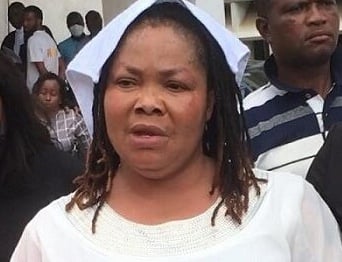This legal saga revolves around a defamation lawsuit filed by renowned gospel singer Empress Gifty against controversial televangelist Evangelist Mama Pat, widely known as Agradaa. The lawsuit, valued at GH₵20 million, stems from allegedly defamatory remarks made by Agradaa against Empress Gifty on social media platforms. The case, initially filed in the Tema High Court, has encountered a procedural hurdle with Agradaa’s legal team requesting a change of venue. This request, submitted during a court hearing on July 16, 2025, seeks to transfer the proceedings from Tema to a court within the Eastern Region of Ghana.
The rationale behind Agradaa’s request lies in her current incarceration at the Nsawam Medium Security Prison, situated in the Eastern Region. She is serving a 15-year sentence with hard labor, a conviction she is simultaneously appealing. Her lawyers argue that her imprisonment in Nsawam effectively makes it her place of residence, thus justifying the transfer of the defamation trial to a court within that jurisdiction. They contend that this would simplify logistical arrangements and align with procedural norms. The request essentially aims to minimize the challenges associated with transporting Agradaa from prison to the Tema High Court for hearings, a process that could be cumbersome and resource-intensive given the security considerations involved.
Empress Gifty’s legal team, led by Patrick Tawiah-Amprofi, has acknowledged the venue change application and indicated their intention to oppose it. While acknowledging Agradaa’s ongoing appeal against her conviction, Tawiah-Amprofi maintains that the venue of the trial does not impact the core issue of the defamation claim. He expressed confidence that justice can be served irrespective of whether the case is heard in Tema or the Eastern Region. This stance suggests that the plaintiff believes the focus should remain on the merits of the defamation case rather than procedural maneuvering. The legal team will present their arguments against the venue change at the subsequent court hearing.
The implications of this venue change request are multifaceted. Firstly, it introduces a potential delay in the defamation proceedings, as the court must now adjudicate on this procedural matter before addressing the substantive issues of the case. The duration of this delay remains uncertain and hinges on the court’s decision regarding the venue. Secondly, the request highlights the interplay between Agradaa’s ongoing appeal and the defamation suit. While the two are distinct legal processes, Agradaa’s legal team may seek to leverage her appeal as part of their argument for a change of venue, potentially adding another layer of complexity to the legal proceedings.
The presence of Agradaa’s husband, Angel Asiamah, and her legal team at the court hearing underscores the significance of the case for both parties involved. It also demonstrates their commitment to pursuing their respective legal strategies. For Agradaa, securing a change of venue could offer practical advantages in managing her legal battles while incarcerated. For Empress Gifty, maintaining the trial in Tema might streamline the process and avoid potential delays associated with a transfer.
The Tema High Court now faces the task of balancing the competing interests and legal arguments presented by both sides. The court must consider the logistical challenges posed by Agradaa’s imprisonment, the potential impact on the progress of the defamation case, and the principles of fair trial and access to justice. The ruling on the venue change application will set the stage for the next phase of this legal battle, determining where and how the substantive defamation claim will be adjudicated. The ongoing proceedings are being closely watched by legal observers and the public, given the high-profile nature of the individuals involved and the substantial financial implications of the lawsuit.


